War in the Gulf : The Song

Regarde à la télé la super info
(continuer)
(continuer)
envoyé par adriana 30/11/2005 - 14:04
Proud To Be A Soldier

The heart of every man in our platoon must swell with pride,
(continuer)
(continuer)
envoyé par Riccardo Venturi 30/11/2005 - 14:03
Die Moorsoldaten [Börgermoorlied; Das Moorlied]
![Die Moorsoldaten [Börgermoorlied; Das Moorlied]](img/thumb/c971_130x140.jpeg?1328359947)
3a. The Peat-Bog Soldiers: La versione inglese
3a. The Peat-Bog Soldiers: The English version
Pete Seeger, February 20, 1965
Carnegie Music Hall, Pittsburgh, Pa.
"Peat Bog Soldiers" (German: Die Moorsoldaten) is one of Europe's best-known protest songs. It exists in countless European languages and became a Republican anthem during the Spanish Civil War[citation needed]. It was a symbol of resistance during the Second World War and is popular with the Peace movement today. It was written, composed and first performed in a Nazi concentration camp by prisoners.
This song was written by prisoners in Nazi moorland labour camps in Lower Saxony, Germany. The Emslandlager ("Emsland camps") – as they were known – were for political opponents of the Third Reich, located outside of Börgermoor, now part of the commune Surwold, not far from Papenburg. A memorial of these camps, the Dokumentations-... (continuer)
3a. The Peat-Bog Soldiers: The English version
Pete Seeger, February 20, 1965
Carnegie Music Hall, Pittsburgh, Pa.
"Peat Bog Soldiers" (German: Die Moorsoldaten) is one of Europe's best-known protest songs. It exists in countless European languages and became a Republican anthem during the Spanish Civil War[citation needed]. It was a symbol of resistance during the Second World War and is popular with the Peace movement today. It was written, composed and first performed in a Nazi concentration camp by prisoners.
This song was written by prisoners in Nazi moorland labour camps in Lower Saxony, Germany. The Emslandlager ("Emsland camps") – as they were known – were for political opponents of the Third Reich, located outside of Börgermoor, now part of the commune Surwold, not far from Papenburg. A memorial of these camps, the Dokumentations-... (continuer)
THE PEAT BOG SOLDIERS
(continuer)
(continuer)
envoyé par Riccardo Venturi 30/11/2005 - 13:53
Normandy Orchards
They're building a camp on the cornfields at Arlingham,
(continuer)
(continuer)
envoyé par Riccardo Venturi 30/11/2005 - 13:43
The Green Fields Of France (No Man's Land)

"No Man's Land" - An Irish parody by Crawford Howard and Fintan Valaly
"No Man's Land" - Parodia irlandese di Crawford Howard e Fintan Valaly
Da/From The Mudcat Café
Una canzone molto famosa, specie se trasmessa e ritrasmessa dai media (o, come si dice, "fatta ascoltare in tutte le salse"), corre l'evidente rischio di annoiare qualche ascoltatore un po' invelenito. Inveleniti, e parecchio, lo devono essere stati gli autori di questa (peraltro esilarante) parodia irlandese degli anni '70, quando "The Green Fields Of France" davvero furoreggiava. Il risultato del loro invelenimento è, appunto, decisamente...velenoso.
"No Man's Land" - Parodia irlandese di Crawford Howard e Fintan Valaly
Da/From The Mudcat Café
Una canzone molto famosa, specie se trasmessa e ritrasmessa dai media (o, come si dice, "fatta ascoltare in tutte le salse"), corre l'evidente rischio di annoiare qualche ascoltatore un po' invelenito. Inveleniti, e parecchio, lo devono essere stati gli autori di questa (peraltro esilarante) parodia irlandese degli anni '70, quando "The Green Fields Of France" davvero furoreggiava. Il risultato del loro invelenimento è, appunto, decisamente...velenoso.
NO MAN'S LAND
(continuer)
(continuer)
envoyé par Riccardo Venturi 30/11/2005 - 13:34
De l'autre côté du pont

non capisco perchè non è Adamo lui stesso che non ha fatto la traduzione
modestofr@yahoo.fr 30/11/2005 - 13:20
Oh! It's A Lovely War!
John P. Long & Maurice Scott
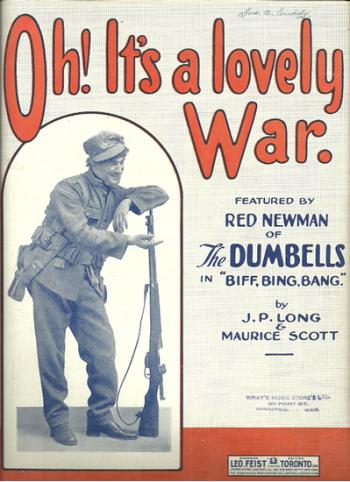
Risalente alla II guerra mondiale, una canzone terribilmente ironica in puro stile yankee (nel senso migliore del termine). Testo ripreso dal canzoniere "Shay, Pious Friends and Drunken Companions", e riprodotto dal Mudcat Café.
The song "Oh! It's a Lovely War" was written by J. P. Long and Maurice Scott in 1917 and was part of the repertoire of music hall star and male impersonator Ella Shields.
Intorno a questa ed altre canzoni risalenti alla Grande Guerra è costruita l'opera musicale "Oh, What a Lovely War!" realizzata nel 1963 da Joan Littlewood and her Theatre Workshop, sulla base di "The Donkeys" di Alan Clark e di "The Good Soldier Švejk" di Jaroslav Hašek.
(Alessandro)
Intorno a questa ed altre canzoni risalenti alla Grande Guerra è costruita l'opera musicale "Oh, What a Lovely War!" realizzata nel 1963 da Joan Littlewood and her Theatre Workshop, sulla base di "The Donkeys" di Alan Clark e di "The Good Soldier Švejk" di Jaroslav Hašek.
(Alessandro)
Up to your waist in water,
(continuer)
(continuer)
envoyé par Riccardo Venturi 29/11/2005 - 21:12
Parcours:
La Grande Guerre (1914-1918)
Desaparecidos
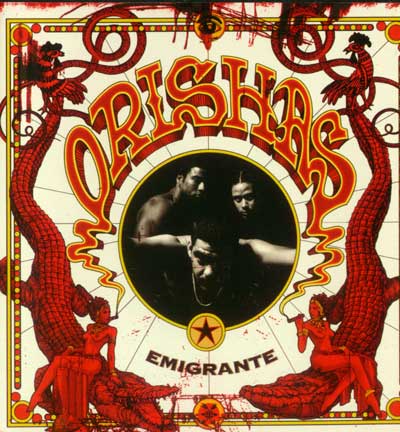
Dall'album "Emigrante" (2002)
Su madre pregunta que pasó
(continuer)
(continuer)
envoyé par adriana 29/11/2005 - 21:01
"G" Suits And Parachutes
anonyme
29 novembre 2005
ANTI-G E PARACADUTE
(continuer)
(continuer)
29/11/2005 - 20:52
Your Flag Decal Won't Get You Into Heaven Anymore
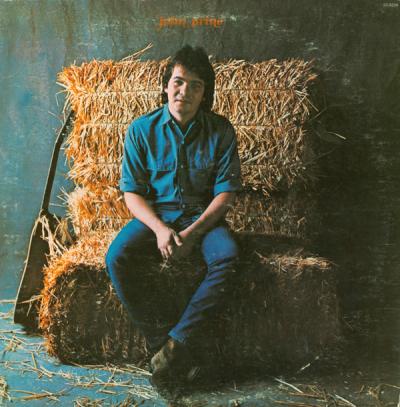
1971
"This next song is for Lois and Ernie, I started out delivering mail to Maywood, then Broadview, and ended up with Westchester - routes nobody wanted. We hated to see Readers Digest come, people who would get them, would get them for the rest of their lives. I didn't read any of it except for 'Humor in Uniform'. At the height of the Viet Nam war, there was a silent majority, they were really quiet - Reader's Digest was part of it, they just stuck these plastic flag decals in their magazine, no reason, they just snuck them in there. The next day, there were flag decals everywhere. Anyway, Lois and Ernie owned the 'Dirty Book Store' and this good old protest song is for them." ~ John Prine, Proviso East High School, Maywood Il, 2/26/00
John Prine
"This next song is for Lois and Ernie, I started out delivering mail to Maywood, then Broadview, and ended up with Westchester - routes nobody wanted. We hated to see Readers Digest come, people who would get them, would get them for the rest of their lives. I didn't read any of it except for 'Humor in Uniform'. At the height of the Viet Nam war, there was a silent majority, they were really quiet - Reader's Digest was part of it, they just stuck these plastic flag decals in their magazine, no reason, they just snuck them in there. The next day, there were flag decals everywhere. Anyway, Lois and Ernie owned the 'Dirty Book Store' and this good old protest song is for them." ~ John Prine, Proviso East High School, Maywood Il, 2/26/00
John Prine
While digesting Reader's Digest
(continuer)
(continuer)
29/11/2005 - 19:33
The Great Mandala

(Peter Yarrow)
So I told him that he'd better shut his mouth
(continuer)
(continuer)
29/11/2005 - 19:24
Ils se meurent nos oiseaux
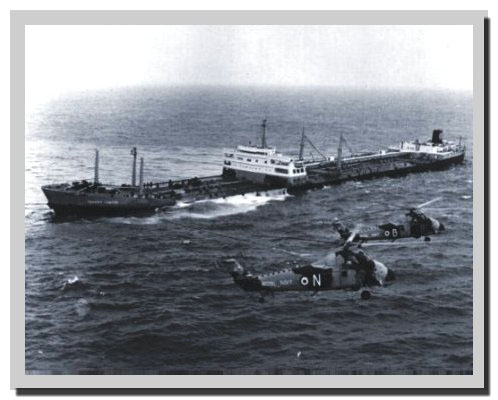
Nel 1967 la petroliera Torrey Canyon disperse nel mare del Regno Unito 121.000 ton. di petrolio.
PARIS, 12 avril 1967
PARIS, 12 avril 1967
Savez-vous les temps
(continuer)
(continuer)
envoyé par adriana 29/11/2005 - 19:07
Parcours:
Guerre à la Terre
Storia di Modesta Rossi
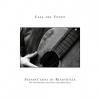
Interpretata assieme a Giovanna Marini
"Modesta Rossi aveva appena 29 anni, moglie del partigiano della Banda Renzino, Dario Polletti, madre di 4 figli maschi.
Il 29 giugno 1944, fascisti del luogo con maschere al viso per non farsi riconoscere, portarono a Solaia i tedeschi. Un fascita uccise con una coltellara all gola il bambino più piccolo, Gloriano, di appena 13 mesi. Poi con un colpo al ventre uccise Modesta. Infine dettero fuoco ai loro corpi. Mario, Gualtiero e Giovanni, gli altri tre figli, di 5, 7 e 9 anni, assistettero al fatto, scappando poi nei boschi alla ricerca del padre."
(Dal libretto di "Sessant'anni di resistenza", Casa del Vento)
Era S. Pietro e Paolo
(continuer)
(continuer)
envoyé par Virginia 29/11/2005 - 18:53
Konskried Sant Trefin
anonyme
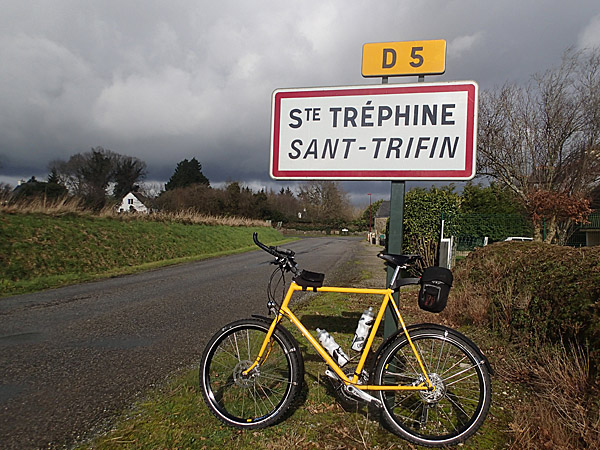
[XVIII secolo?]
Kan ha diskan (Côtes d'Armor)
Chiunque abbia seguito un po' in passato la Sezione Bretone di questo sito, oppure la stia seguendo adesso durante il suo completo rifacimento, avrà notato che le canzoni (specie in forma di kan ha diskan) dedicate alla partenza del coscritto sono numerosissime (e non solo in Bretagna). Popolarizzate invariabilmente da fogli volanti, si crede generalmente che le “ballate dei coscritti” abbiano avuto origine nell'istituzione della leva obbligatoria in epoca rivoluzionaria e napoleonica (al pari, ad esempio, di Partirò, partirò, che non a caso si chiama, propriamente, Canto dei coscritti). Diffusi in realtà in tutta Europa, è certamente vero che questi canti che descrivono la nuova realtà venutasi a creare con la coscrizione obbligatoria (la fondazione della “carne da cannone”, verrebbe da dire) abbiano avuto in quell'epoca il loro “momento d'oro”.... (continuer)
Kan ha diskan (Côtes d'Armor)
Chiunque abbia seguito un po' in passato la Sezione Bretone di questo sito, oppure la stia seguendo adesso durante il suo completo rifacimento, avrà notato che le canzoni (specie in forma di kan ha diskan) dedicate alla partenza del coscritto sono numerosissime (e non solo in Bretagna). Popolarizzate invariabilmente da fogli volanti, si crede generalmente che le “ballate dei coscritti” abbiano avuto origine nell'istituzione della leva obbligatoria in epoca rivoluzionaria e napoleonica (al pari, ad esempio, di Partirò, partirò, che non a caso si chiama, propriamente, Canto dei coscritti). Diffusi in realtà in tutta Europa, è certamente vero che questi canti che descrivono la nuova realtà venutasi a creare con la coscrizione obbligatoria (la fondazione della “carne da cannone”, verrebbe da dire) abbiano avuto in quell'epoca il loro “momento d'oro”.... (continuer)
Na disul e Sant-Trefin rannañ 'rae ma c'halon
(continuer)
(continuer)
envoyé par Riccardo Venturi 29/11/2005 - 17:03
Dén ieuank en armé
anonyme
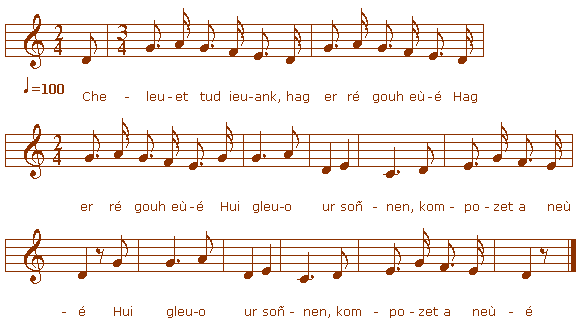
Da Son Ha Ton, il sito della canzone popolare bretone.
I "canti dei coscritti", bretoni e di molti altri paesi, hanno come si è visto trame fisse: se il giovane soldato non è morto in guerra, una volta tornato a casa passati i fatidici sette anni, o trova la fidanzata già bell'e morta, o la trova sposata a qualcun altro. Questo Dén ieuank en armé appartiene alla seconda categoria; è tratto, come informa Son ha Ton ("Canto e Musica"), dalla raccolta Guerzennou ha soñnenneu Bro-Guened / Chansons populaires du Pays de Vannes di Loeiz Herrieu e Maurice Duhamel, pubblicato originariamente nel 1911 e ripubblicato nel 1997 dalle edizioni Eromi di Lorient. La canzone, ovviamente nell'ostico dialetto Vannetais (che storicamente, e con fondamento, potrebbe tradursi come "Veneto"...) fu raccolta da una tale Mélanie Kermabon di Goh-Kér ("Borgovecchio") nel Lann-er-Stér. La canzone è rimasta per oltre... (continuer)
I "canti dei coscritti", bretoni e di molti altri paesi, hanno come si è visto trame fisse: se il giovane soldato non è morto in guerra, una volta tornato a casa passati i fatidici sette anni, o trova la fidanzata già bell'e morta, o la trova sposata a qualcun altro. Questo Dén ieuank en armé appartiene alla seconda categoria; è tratto, come informa Son ha Ton ("Canto e Musica"), dalla raccolta Guerzennou ha soñnenneu Bro-Guened / Chansons populaires du Pays de Vannes di Loeiz Herrieu e Maurice Duhamel, pubblicato originariamente nel 1911 e ripubblicato nel 1997 dalle edizioni Eromi di Lorient. La canzone, ovviamente nell'ostico dialetto Vannetais (che storicamente, e con fondamento, potrebbe tradursi come "Veneto"...) fu raccolta da una tale Mélanie Kermabon di Goh-Kér ("Borgovecchio") nel Lann-er-Stér. La canzone è rimasta per oltre... (continuer)
Cheleuet tud ieuank, hag er ré gouh eùé
(continuer)
(continuer)
envoyé par Riccardo Venturi 29/11/2005 - 16:51
People Are People

Album: "Some Great Reward" (1984)
People are people
(continuer)
(continuer)
28/11/2005 - 23:10
Vientos del pueblo
Il testo è tratto dal libretto del cofanetto "Victor Jara" edito da "Plane 88747"
L'ortografia della versione è stata corretta e aggiustata rispetto a quella del libretto, contenente numerosi errori.
L'ortografia della versione è stata corretta e aggiustata rispetto a quella del libretto, contenente numerosi errori.
STÜRME DES VOLKES
(continuer)
(continuer)
envoyé par Virginia 28/11/2005 - 20:00
Preguntas por Puerto Montt

Il testo è tratto dal libretto del cofanetto "Victor Jara" edito da "Plane 88747"
L'ortografia della versione è stata corretta e aggiustata rispetto a quella riportata nel libretto, contenente numerosi errori.
L'ortografia della versione è stata corretta e aggiustata rispetto a quella riportata nel libretto, contenente numerosi errori.
FRAGEN ZU PUERTO MONTT *
(continuer)
(continuer)
envoyé par Virginia 28/11/2005 - 19:50
La Toma

Il testo è tratto dal libretto del cofanetto "Victor Jara" edito da "Plane 88747"
L'ortografia della versione è stata corretta e aggiustata rispetto a quella riportata nel libretto, contenente numerosi errori.
L'ortografia della versione è stata corretta e aggiustata rispetto a quella riportata nel libretto, contenente numerosi errori.
DIE TOMA - 16 MÄRZ 1967
(continuer)
(continuer)
envoyé par Virginia 28/11/2005 - 19:41
Te recuerdo Amanda

Il testo è tratto dal libretto del cofanetto "Victor Jara" edito da "Plane 88747"
L'ortografia della versione è stata corretta e aggiustata rispetto a quella riportata nel libretto, contenente numerosi errori.
L'ortografia della versione è stata corretta e aggiustata rispetto a quella riportata nel libretto, contenente numerosi errori.
AN DICH DENKE ICH, AMANDA
(continuer)
(continuer)
envoyé par Virginia 28/11/2005 - 19:33
Faubourg de Buenos Aires

C'est un faubourg de Buenos Aires,
(continuer)
(continuer)
envoyé par adriana 28/11/2005 - 19:28
Herminda de la Victoria

Tratta dal libretto del cofanetto "Victor Jara" edito da "Plane 88747".
Nota: L'ortografia della versione è stata corretta è aggiustata rispetto a come riportata sul libretto, in quanto contenente numerosi errori.
Nota: L'ortografia della versione è stata corretta è aggiustata rispetto a come riportata sul libretto, in quanto contenente numerosi errori.
HERMINDA DES SIEGES
(continuer)
(continuer)
envoyé par Virginia 28/11/2005 - 19:12
Guantànamo

2004 - " Chansons têtues "
Assis sur le bord de la roche
(continuer)
(continuer)
envoyé par adriana 28/11/2005 - 18:07
Parcours:
Guantanamo Bay
The Star Spangled Banner

Come abbiamo detto, il testo di "The Star Spangled Banner" può riservare qualche sorpresa anche nell'ottica di una canzone contro la guerra. Certo, è necessario tener presente che i riferimenti alla pace e alla desolazione della guerra sono del tutto funzionali ad un testo che è in realtà un inno di resistenza e di battaglia.
LO STENDARDO LUCENTE DI STELLE
(continuer)
(continuer)
28/11/2005 - 15:36
Franco
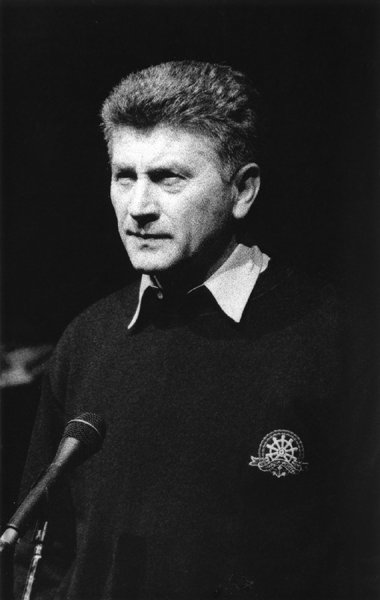
Questa canzone, dedicata a Franco Coggiola, ricercatore di cultura popolare, ricorda l'importanza della memoria.
Come sarebbe più opportuno
(continuer)
(continuer)
envoyé par Virginia 28/11/2005 - 15:26
Guerra e Pace
Una canzone per bambini sulla pace, da
http://www.junior.rai.it/america/melev...
http://www.junior.rai.it/america/melev...
Guerra, guerra! È guerra!
(continuer)
(continuer)
27/11/2005 - 23:48
Papá cuéntame otra vez

[1997]
Letra y música: Ismael Serrano
Testo e musica: Ismael Serrano
Album: Atrapados en Azul
Letra y música: Ismael Serrano
Testo e musica: Ismael Serrano
Album: Atrapados en Azul
Papá cuéntame otra vez ese cuento tan bonito
(continuer)
(continuer)
envoyé par adriana 27/11/2005 - 20:53
Parcours:
1968 et environs
Joan Of Arc, They're Calling You
Frank Sturgis
[1915]
Frank Sturgis, un nome assai curioso per una (bella) canzone contro la guerra. Il Mudcat Café riporta sotto questo nome l'autore di questa canzone del 1915; ma è assolutamente impossibile reperire notizie su di lui. Se ne reperiscono moltissime, invece, su un suo perfetto omonimo, che vi invitiamo a leggere per pura curiosità.
Frank Sturgis, un nome assai curioso per una (bella) canzone contro la guerra. Il Mudcat Café riporta sotto questo nome l'autore di questa canzone del 1915; ma è assolutamente impossibile reperire notizie su di lui. Se ne reperiscono moltissime, invece, su un suo perfetto omonimo, che vi invitiamo a leggere per pura curiosità.
There's a tear in my eye for the soldier,
(continuer)
(continuer)
envoyé par Riccardo Venturi 27/11/2005 - 19:34
Parcours:
La Grande Guerre (1914-1918)
The Star Spangled Banner

« The Star Spangled Banner » fu composto da Frances Scott Key durante l’attacco inglese a Fort McHenry, il 13 settembre 1814. Key, dalla natia Baltimora, si era recato al quartier generale della flotta britannica per ottenere il rilascio di un amico, tenuto prigioniero. Arrivò la vigilia del bombardamento della città da parte degli inglesi, ma non gli fu permesso di sbarcare dal suo battello. Per tutto il giorno e tutta la notte guardò ansiosamente dal ponte la battaglia che stava svolgendosi. All’alba, vide che la bandiera a Stelle e Strisce ancora sventolava sul forte, e ne rimase talmente e profondamente emozionato da scrivere immediatamente una poesia dedicata all’avvenimento. La poesia di Scott Key fu poi, curiosamente, adattata alla melodia di un’antica « drinking song » inglese, To Anacreon In Heaven, una canzone godereccia dove si invitava a unire « The Myrtle of Venus with Bacchus’ Wine » e che era assai conosciuta nella Nuova Inghilterra dell’epoca.
THE STAR SPANGLED BANNER
(continuer)
(continuer)
envoyé par Riccardo Venturi 27/11/2005 - 12:45
Soldier On The Bum

He grew up right in this neighborhood
(continuer)
(continuer)
envoyé par adriana 27/11/2005 - 10:38
Where Have all the Flowers Gone

TURCO/TURKISH/TURC
Oğuz Tarihmen
Turkish version by Oğuz Tarihmen
Versione turca di Oğuz Tarihmen
Version turcque d'Oğuz Tarihmen
As a songwriter and a Turkish street musician, 9 years ago, I had translated the song "Where have all the flowers gone" via the German translation. I was a school boy at the German School, Istanbul, so I used the German translation as the starting point of my Turkish translation. Today I am a teacher of the German language. After some time, I realized that the original of the song is in English. So, I crosschecked it and did some correction after which my translation has become its final version. My translation is linear to the German translation, then.
My Turkish translation is fully singable. In deed, I had sung it in English, German and Turkish many years in my band during my career as a street musician. Some people in Turkey know my version of the song... (continuer)
Oğuz Tarihmen
Turkish version by Oğuz Tarihmen
Versione turca di Oğuz Tarihmen
Version turcque d'Oğuz Tarihmen
As a songwriter and a Turkish street musician, 9 years ago, I had translated the song "Where have all the flowers gone" via the German translation. I was a school boy at the German School, Istanbul, so I used the German translation as the starting point of my Turkish translation. Today I am a teacher of the German language. After some time, I realized that the original of the song is in English. So, I crosschecked it and did some correction after which my translation has become its final version. My translation is linear to the German translation, then.
My Turkish translation is fully singable. In deed, I had sung it in English, German and Turkish many years in my band during my career as a street musician. Some people in Turkey know my version of the song... (continuer)
SÖYLE ÇİÇEKLER NERDE?
(continuer)
(continuer)
envoyé par Oğuz Tarihmen 23/11/2005 - 13:42
Nella mia ora di libertà
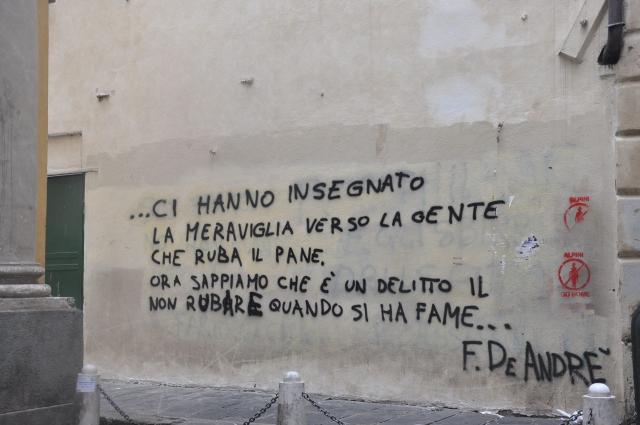
[1973]
Testo e musica di Fabrizio De André e Giuseppe Bentivoglio
Collaborazione musicale di Nicola Piovani
Lyrics and music by Fabrizio De André and Giuseppe Bentivoglio
Musical collaboration by Nicola Piovani
Album: "Storia di un impiegato"
"Nel carcere, in una realtà non più individualista, ma forse il massimo dell'essere uguali, l'impiegato non più impiegato scopre un nuovo modo di capire la vita e le cose che lo circondano. Scopre la realtà della parola «collettivo» e della parola «potere»." - Fabrizio De André
Testo e musica di Fabrizio De André e Giuseppe Bentivoglio
Collaborazione musicale di Nicola Piovani
Lyrics and music by Fabrizio De André and Giuseppe Bentivoglio
Musical collaboration by Nicola Piovani
Album: "Storia di un impiegato"
"Nel carcere, in una realtà non più individualista, ma forse il massimo dell'essere uguali, l'impiegato non più impiegato scopre un nuovo modo di capire la vita e le cose che lo circondano. Scopre la realtà della parola «collettivo» e della parola «potere»." - Fabrizio De André
Di respirare la stessa aria
(continuer)
(continuer)
envoyé par Fabio 22/11/2005 - 21:52
Parcours:
Des prisons du monde
I Remember Warsaw
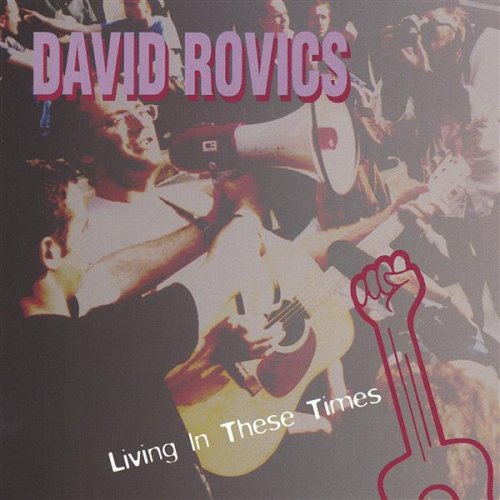
[February 2001]
Lyrics and music by David Rovics
Testo e musica di David Rovics
From/Da "Living In These Times]]
David Rovics' Official Website
Lyrics and music by David Rovics
Testo e musica di David Rovics
From/Da "Living In These Times]]
David Rovics' Official Website
First they occupied our country
(continuer)
(continuer)
envoyé par adriana 22/11/2005 - 17:16
Poder
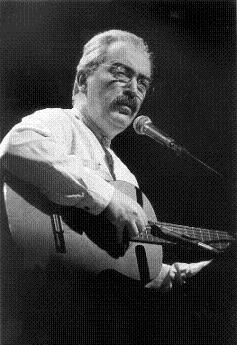
Letra e música de José Mário Branco
Testo e musica di José Mário Branco
Album: Resistir é vencer
Per l'ascolto: Link
Testo e musica di José Mário Branco
Album: Resistir é vencer
Per l'ascolto: Link
Um herói
(continuer)
(continuer)
envoyé par adriana 22/11/2005 - 16:17
Turuta per un món nou
Tom Dalmau
22 novembre 2005
« TURUTA » PER UN MONDO NUOVO
(continuer)
(continuer)
22/11/2005 - 13:58
Cantiga do fogo e da guerra

22 novembre 2005
CANTICA DEL FUOCO E DELLA GUERRA
(continuer)
(continuer)
22/11/2005 - 11:23
×
![]()




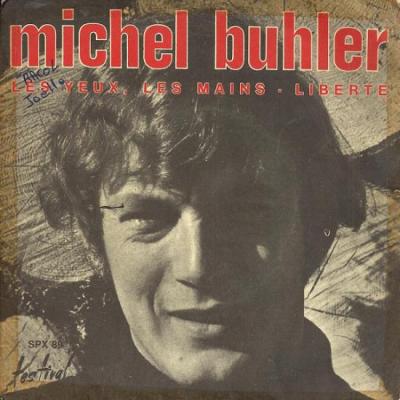
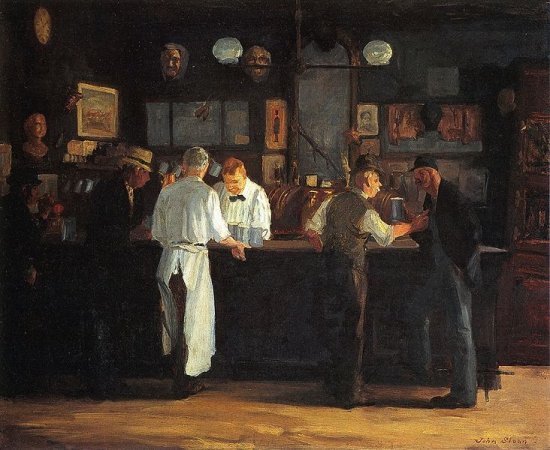
![Le chant des ouvriers [Buvons à l'indépendance du monde]](img/upl/115562383_o.png)
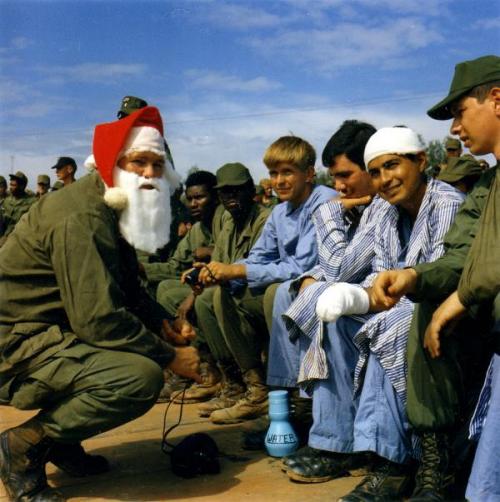






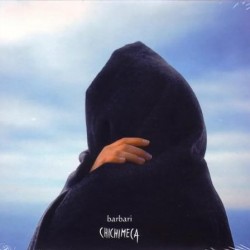


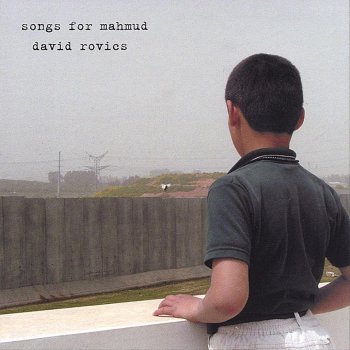


It was based on a true story out of Irag earlier this year.
Thanks so much for posting my music on this site. I'm sorry I don't speak Italian!
Dave Preston